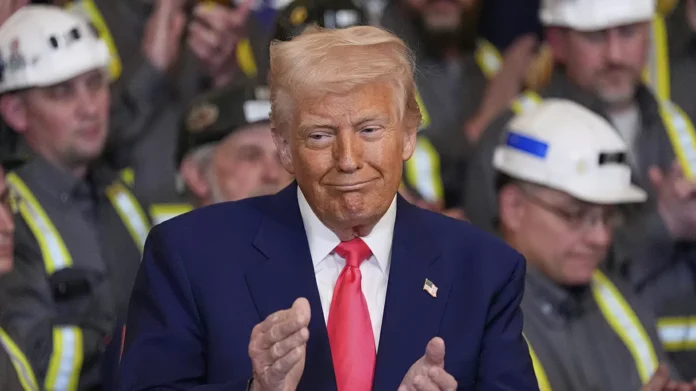The Trump administration has recently announced a series of new barriers for renewable energy projects, causing concern among moderate Republicans and the renewable energy industry. These moves, which seem to cater to hard-line conservatives, have raised questions about the future of renewable energy in the United States and the potential impact on power prices.
As the world continues to grapple with the effects of climate change, the need for clean and sustainable energy sources has become more pressing than ever. Renewable energy, such as solar and wind power, has emerged as a viable solution to reduce our reliance on fossil fuels and decrease carbon emissions. However, the Trump administration’s recent actions have cast a shadow of uncertainty over the future of renewable energy in the country.
The first barrier put up by the administration is the decision to impose tariffs on imported solar panels and cells. This move, which was met with strong opposition from the renewable energy industry, is expected to increase the cost of solar projects and slow down their development. The administration argues that these tariffs will protect American manufacturers and create jobs, but critics argue that it will only hurt the industry and hinder its growth.
The second barrier is the proposed repeal of the Clean Power Plan, an Obama-era policy aimed at reducing carbon emissions from power plants. The plan encouraged the use of renewable energy and set targets for states to decrease their carbon footprint. However, the Trump administration has deemed it as a burden on the coal industry and is working towards its repeal. This decision has been met with backlash from environmental groups and renewable energy advocates, who argue that it will hinder the progress towards a cleaner and more sustainable future.
These barriers have raised concerns among moderate Republicans, who have traditionally been supportive of renewable energy. Senator Chuck Grassley, a Republican from Iowa, has been a vocal advocate for wind energy and has expressed his disappointment with the administration’s actions. He stated, “If you’re a rational Republican senator who believes in free trade, you’re not going to be happy with this decision.”
The renewable energy industry has also expressed its concerns about the potential impact of these barriers. The Solar Energy Industries Association (SEIA) predicts that the tariffs on solar panels could result in the loss of 23,000 jobs and the delay of billions of dollars in solar investments. This could also lead to an increase in power prices, as renewable energy becomes less competitive compared to traditional sources.
The administration’s actions have also sparked criticism from environmental groups and climate activists. They argue that these barriers are a step backward in the fight against climate change and will only benefit the fossil fuel industry. The Sierra Club’s Executive Director, Michael Brune, stated, “Trump’s decision to impose tariffs on solar panels and repeal the Clean Power Plan is a blatant attack on clean energy and a gift to the coal industry.”
Despite these challenges, the renewable energy industry remains resilient and determined to continue its growth. The SEIA has stated that they will work with the administration to find a solution that benefits both American manufacturers and the solar industry. They also remain optimistic about the future of renewable energy, citing the decreasing costs of solar and wind power as a driving force for its continued growth.
In conclusion, the Trump administration’s decision to put up barriers for renewable energy projects has caused concern and uncertainty among moderate Republicans and the renewable energy industry. These moves are expected to create issues for the industry and could potentially raise power prices. However, the renewable energy industry remains determined to overcome these challenges and continue its growth towards a cleaner and more sustainable future. It is now up to the administration to work towards finding a solution that benefits both the economy and the environment.

